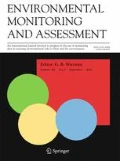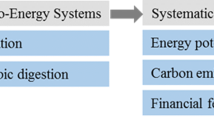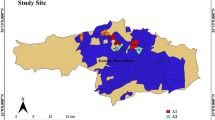Abstract
This paper provides an overview of the trend of generation, composition, and management of municipal solid waste, and estimates the carbon emissions arising from municipal solid waste management in Beijing. The correlation analysis conducted shows that the generation of municipal solid waste in Beijing has been growing steadily, showing high correlations (r > 0.9) to the total GDP, per capita income, and the population. Food waste showed an increasing trend since 1990. Compared with the results of an investigation in 1990, ash and woodchips content in 2003 declined from 56% to 17%, while the percentage of paper and plastic increased from 10% to 29% over the same period. The calorific value of the municipal waste also increased, from 2,686 kJ/kg in 1990 to 4,667 kJ/kg in 2003, indicating that the waste is suitable for incineration. Currently, the source separation ratio of municipal waste is approximately 15%. About 94% of all the collected solid waste goes to the landfill while 4% is composted and 2% is incinerated. A moderate garbage collection fee is applied to both permanent and temporary residents in Beijing, but the willingness to pay for solid waste collection and treatment is still low. Under current treatment mode, the total amounts of carbon emission from waste disposal sites and incineration increased with the increase of municipal solid waste, from 29.8 Gg in 1990 to 84.5 Gg in 2003, including 83.3 Gg of CH4 and 22.0 Gg of CO2. The data availability and methodological challenges in monitoring the quantity and characteristics of municipal solid waste are discussed.
Similar content being viewed by others
References
Bai, R., & Sutanto, M. (2002) The practice and challenges of solid waste management in Singapore. Waste Management, 22, 557–567.
Beijing Statistics Bureau (1990–2003). Beijing statistical yearbook from 1990 to 2003. Beijing: China statistics press, (In Chinese).
Boyle, C. A. (2000). Solid waste management in New Zealand. Waste Management, 20, 517–526.
Buenrostro, O., & Bocco, G. (2003). Solid waste management in municipalities in Mexico: Goals and perspectives. Resources Conservation & Recycling, 39, 251–263.
Chen, L. Y., Zhong, S. S., Pan, Z. S., & Qing, Y. J. (2000), Composition and treatment strategies of Hongkong, Guangzhou, Foshan and Beijing municipal solid waste. Environmental Science,18(2), 58–61, (in Chinese).
Dong, S. S., Tong, K. W., & Wu, Y. P. (2001) Municipal solid waste management in China: Using commercial management to solve a growing problem. Utilities Plicy,10, 7–11. http://china5e.com/dissertation/naturalgas/0058.htm (in Chinese).
Intergovernmental Panel on Climate Change (2001). Good Practice Guidance and Uncertainty Management in National Greenhouse Gas Inventories. Chapter 5, Waste. http://www.ipcc-nggip.iges.or.jp
Li, G. X., Huang, B., & Jiang, H. (1999). Investigation and Evaluation on Treatment and Utilization of Beijing Municipal Garbage. Journal of China Agricultural University,4, 103–108 (In Chinese).
Li, Y. C., Li, Y. F., Rong, B., & Liu, X. (2005). Status and problems analysis of MSW composting in Beijing. Environmental Sanitation Engineering,13(4), 24–28, (in Chinese).
Luo, T., Ouyang, Zh., Wang, X., Miao, H.,& Zheng, H. (2005). Dynamics of Urban Food-carbon Consumption in Beijing Households. Acta Ecologica Sinica,25(12), 3252–3258, (In Chinese).
Mongkolnchaiarunya, J. (2005). Promoting a community-based solid waste management initiative in local government: Yala municipality, Thailand. Habitat International,29(1), 27–40.
Pokhrel, D., & Viraraghavan, T. (2005). Municipal solid waste management in Nepal: Practices and challenges. Waste Management,25, 555–562.
Rong, B., Wei, P. M., Li, Y. F., & Li, Y. C. (2004). Composition Analysis to Beijing’s Domestic Refuse and Corresponding Treatment Countermeasure. Environmental Protection,10, 30–33, (In Chinese).
Sun, J., Lv, Z. Q., Zhang, Y. M., & Liu, X. G. (2006). Treatment strategies of Beijing municipal solid waste. Chinese Journal of Urban Environmental Sanitation,2, 33–37.
Suocheng, D., Tong, K. W., & Yuping, W. (2001). Municipal solid waste management in China: Using commercial management to solve a growing problem. Utilities Policy, 10, 7–11.
Tchobanoglous, G., Theisen, H., & Vigil, S. (1993) Integrated solid waste management: Engineering principles and management issues. McGraw-Hill, New York, USA. pp. 282–283.
Thapa, G. B. (1998). Lessons learned from solid waste management in Kathmandu, Nepal. Habitat International, 22(2), 97–114.
Wang, W. P. (2000) Research on solutions to domestic solid waste in cities of China. Journal of Natural Resources,15(2), 128–132 (In Chinese).
White paper on the domestic garbage disposal in Beijing (2004). Chinese Journal of Urban Environmental Sanitation, 1, 9–12 (In Chinese).
Yu, G. (1997). Methane emission from urban solid waste. Progresses in Environmental Science,15(2), 67–74 (In Chinese).
Yuan, H., Wang, L. A., Su, F. W., & Hu, G. (2005). Urban solid waste management in Chongqing: Challenges and opportunities. Waste Management, (in press). dio: 10. 1016/j. wasman. 2005. 09. 005.
Zhou, C. H., Lu, M. X., Wu, W. W., & Bai, R. (2003) Prediction of municipal solid waste output in Beijing. Journal of China University of Mining & Technology, 32(2), 169–172, (In Chinese).
Zhou, C. H., Lu, M. X., & Wu, W. W. (2004). On prediction of municipal solid waste classification in Beijing. Journal of Safety and Environment, 4(5), 37–40 (In Chinese).
Author information
Authors and Affiliations
Corresponding author
Rights and permissions
About this article
Cite this article
Xiao, Y., Bai, X., Ouyang, Z. et al. The composition, trend and impact of urban solid waste in Beijing. Environ Monit Assess 135, 21–30 (2007). https://doi.org/10.1007/s10661-007-9708-0
Received:
Revised:
Accepted:
Published:
Issue Date:
DOI: https://doi.org/10.1007/s10661-007-9708-0




